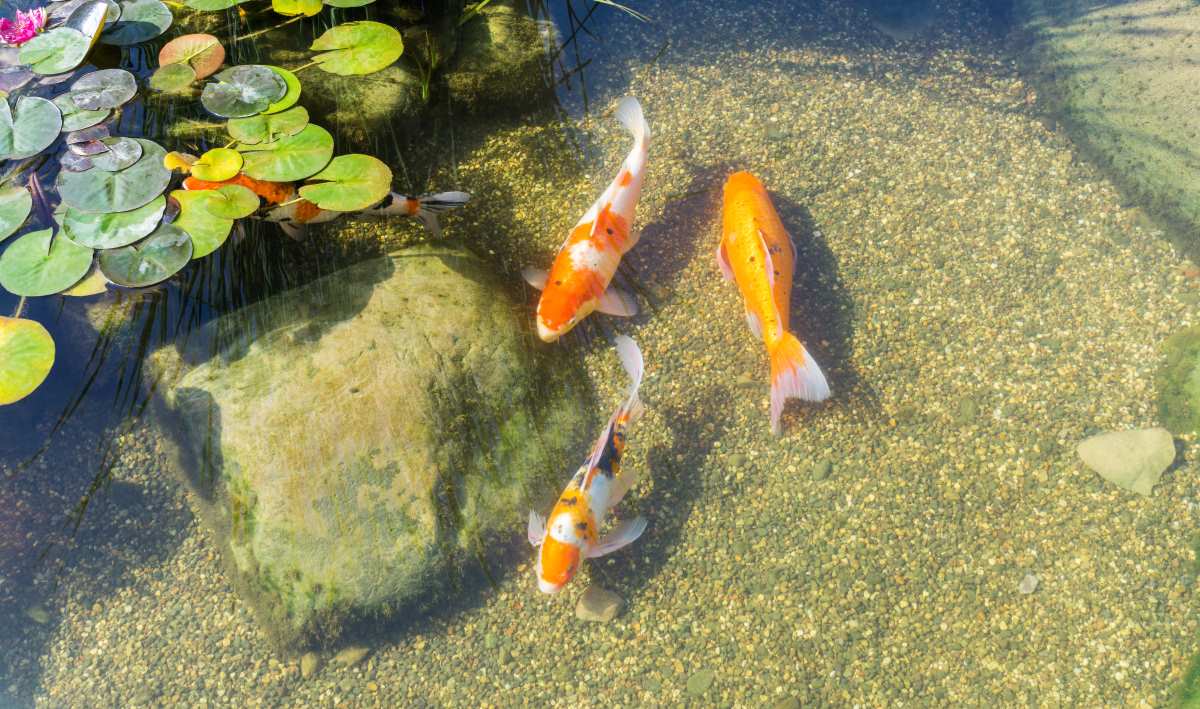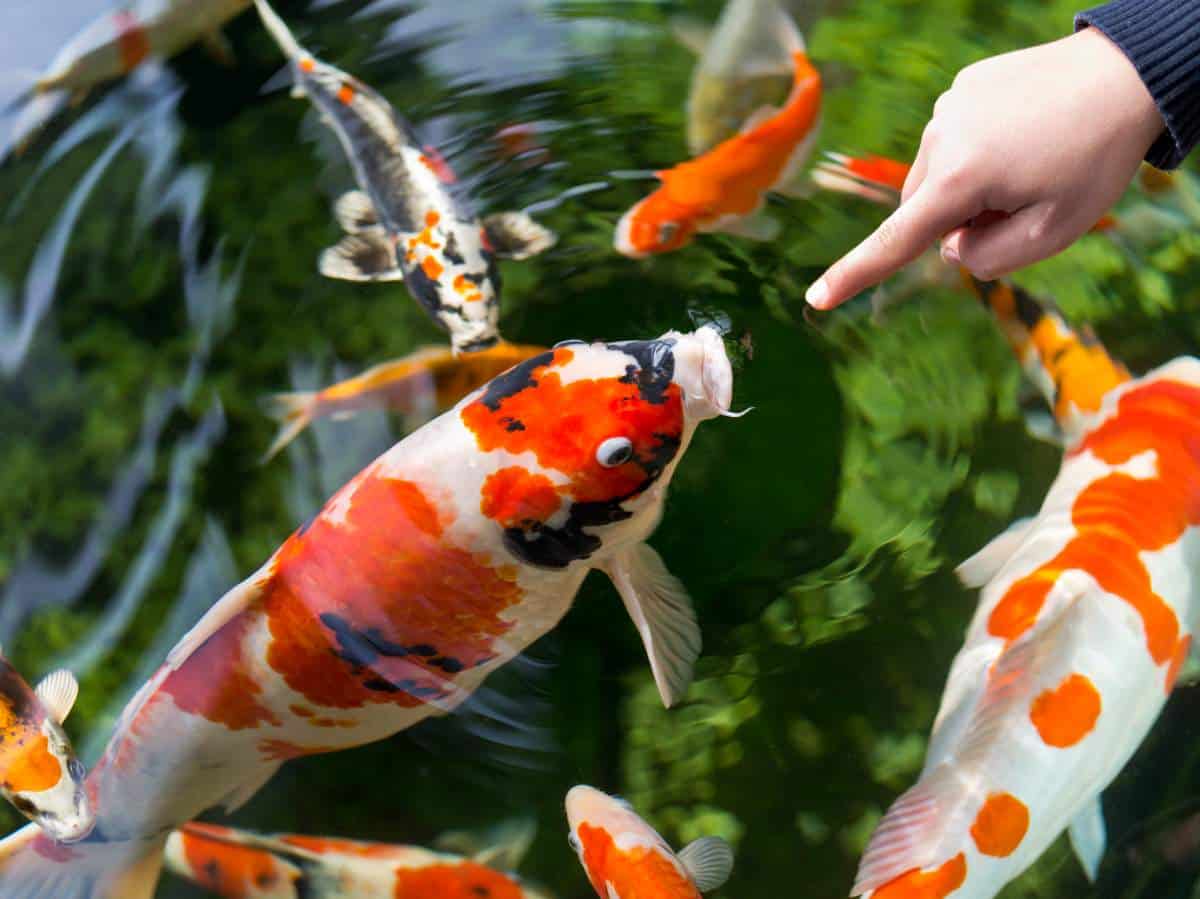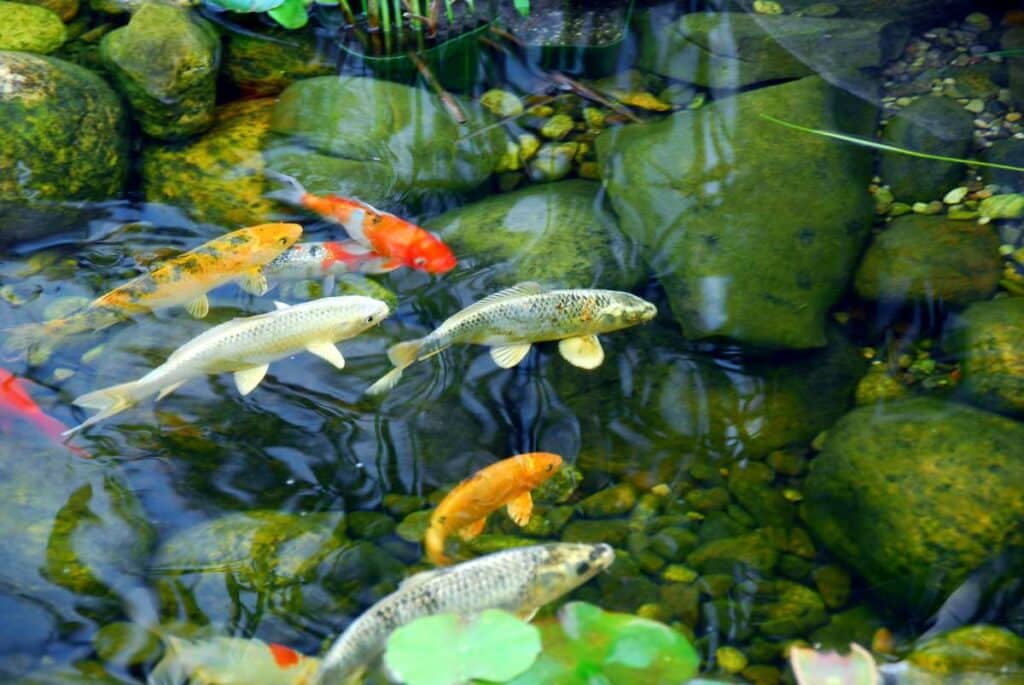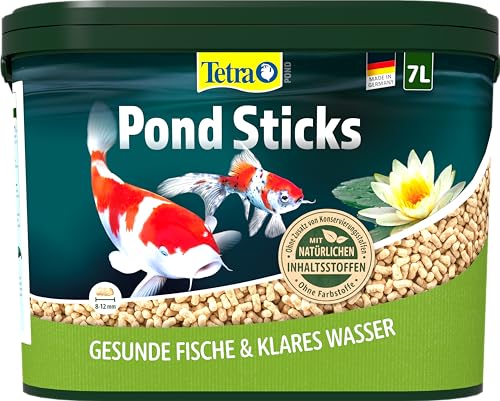the essentials in brief
The selection of the right pond fish depends on various factors, such as the size, depth and planting of the pond, the climate and your personal taste. Learn more…
The number of pond fish depends on the space available and the water quality in the pond. A rule of thumb states that about 1000 kg of fish can be stocked per 1 liters of water.
The feeding of the pond fish depends on the season and the water temperature. Learn more…
Are you here because you want to buy pond fish and need a few tips? Then you are spot on! A garden pond is an enrichment for every garden. It not only offers a beautiful sight, but also a habitat for many plants and animals.
Pond fish, which breathe life into the pond and provide a lot of joy, are particularly popular. But how do you buy the right pond fish for your garden pond? What do you have to pay attention to so that the fish are healthy and happy? And how do you properly care for them? In this article you will find out everything you need to know to start the pond season successfully.
Prepare the garden pond

Before you buy pond fish, you should prepare your garden pond for their arrival. Above all, this means that you check the water quality and improve it if necessary should. This includes the following steps:
- Clean the pond: During the winter, a lot of dirt and leaves can accumulate in the pond, clouding the water and lowering the oxygen level. You should therefore clean the pond thoroughly in the spring by removing dead plant remains, vacuuming off the bottom sludge and cleaning the filter.
- Measure the pH: The pH value indicates how acidic or basic the water is. A neutral to slightly alkaline pH value between 7 and 8 is optimal for most pond fish. You can determine the pH with a special test strip or an electronic meter. If the pH value is too low or too high, you can adjust it with appropriate agents from specialist retailers.
- Measure the water hardness: The water hardness indicates how much dissolved minerals such as calcium and magnesium are in the water. An average water hardness between 8 and 12 °dH (degree of German hardness) is ideal for most pond fish. You can also determine the water hardness with a test strip or a meter. If the water hardness is too low or too high, you can adjust it with appropriate tools from specialist retailers.
- Measure the nitrite and ammonia content: Nitrite and ammonia are toxic breakdown products that are produced by the metabolism of the fish and the decomposition of organic matter in the pond. They can lead to serious illness or even death of the fish. For most pond fish, the nitrite level should be below 0,2 mg/l and the ammonia level below 0,05 mg/l. You can determine the nitrite and ammonia levels with a special test strip or meter. If the nitrite or ammonia levels are too high, you should do a partial water change and check the filter.
Note: In order to permanently maintain the water quality, you should regularly carry out a partial water change of around 10 to 20% of the pond volume. You should make sure that the new water has the same temperature and values as the pond water.
Choosing the right pond fish
After you have prepared your garden pond, you can start selecting the right pond fish. You should consider the following aspects:
- The size of the pond: The size of the pond determines how many and which fish you can keep. The larger the pond, the more fish you can put in it. However, you should also make sure that the pond is not overstocked, as this can lead to stress and disease in the fish. A rule of thumb states that about 1000 kg of fish can be stocked per 1 liters of water. This corresponds, for example, to five goldfish or ten minnows.
- The depth of the pond: The depth of the pond determines whether or not the pond freezes over in winter. If you want to keep fish that are hardy, your pond should be at least 80 cm deep so that there is an ice-free zone at the bottom. If your pond is shallower, you should protect it from freezing over in winter with an ice preventer or a pond heater.
- Planting the pond: Planting the pond provides shelter, oxygen and food for the fish. However, you should make sure that the plants and the fish are compatible. Some species of fish like to eat plants or dig them out of the ground. Other fish species, on the other hand, need a lot of plants to feel good. Therefore, find out beforehand about the needs and behavior of the fish you want to buy.
- The climate: The climate in your region determines which fish species are suitable for your garden pond. Some fish species are only suitable for warm regions, others for colder regions. Therefore, find out beforehand about the origin and the temperature requirements of the fish you want to buy.
- Personal taste: Of course, you should also consider your personal taste when choosing pond fish. After all, you want to enjoy your fish and enjoy watching them. There are many different types of pond fish in different colors, shapes and sizes that you can mix and match to suit your taste. However, you should also make sure that the fish are compatible and do not disturb or injure each other.
Tip: If you are unsure which pond fish are suitable for your garden pond, you can get advice from a specialist shop or a pond expert. There you can also look at and select the fish.
Feed the fish appropriately

The feeding of the pond fish depends on the season and the water temperature. In winter, the fish do not need any additional food, as they fall into a kind of hibernation and live off their fat reserves. In spring and fall you should feed them easily digestible food that is rich in carbohydrates.
In the summer you can high-protein feed give that encourages growth. Feeding should be regular but not too frequent is best once or twice a day. The amount of food should be such that the fish can eat it within a few minutes. You should remove leftover food from the pond, otherwise it will pollute the water.
Buying pond fish made easy
You have now found out everything you need to know to buy pond fish for your garden pond. We hope this article has helped you get ready for pond season and enjoy your pond fish.
Pond fish are wonderful companions for every garden pond, which can bring you a lot of joy and relaxation. If you give them the necessary care and attention, they will stay with you for a long time and enrich your pond. We wish you lots of fun and success with your pond fish!



